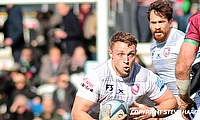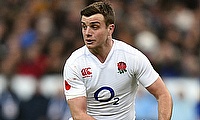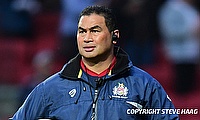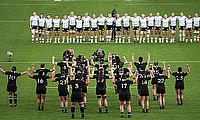Stef Evans Exclusive - Falling back in love with rugby and turning #ICare awareness into action
All the best love stories start in Las Vegas.
I mean it makes sense. In one city, you have the Eiffel Tower, Egyptian Pyramids and The Venice Grand Canal!
Three of the most romantic places on Earth, all in the same city combined with the ability to have a ‘drive-thru’ wedding… How could romance not blossom?!
Vegas wasn’t the city where Stef Evans first fell head over heels for rugby though, but after a hiatus lasting almost 10 years, it is where she fell back in love with the great game: "I was playing for Rogue Samurai, a women’s team that was sending a side to the Vegas 7’s’" she tells me. "I’m not a natural 7’s player, but I thought it would be fun so I went along."
Evans did have fun on the Vegas tour (find me a person who wouldn’t?!), but it was a conversation with the side’s coach Terry Pledger, who in Stef’s own words is an ‘old breed rugby coach’, that reignited her spark and love for the game itself.
"He was the first person in a long time to tell me I was actually good at rugby. I protested and told him I was having a nice time, but he insisted that I was actually good."
To find out why this was such a huge moment in Stef’s career, and life, you have to dig deeper and look behind the curtain.
You have to look past the physically dominant and athletically gifted prop you see on a Saturday for Bristol Bears or the shrewd and passionate businesswoman behind the company Ruggette and the #ICare movement. You have to go back to the start, to the young Canadian girl just trying to fit in.
"Across Canada, the major sport is ice hockey, probably followed by football (the American kind where they throw it) but unfortunately these weren’t sports girls were encouraged to try at the time. I didn’t actually know rugby existed until high school when I heard my school was starting a team. I have always wanted to be an athlete. I lost count of the number of sports I tried growing up, but the way I am built and the way I look at sports and competition meant I always struggled with the non-contact aspect of the sports I was playing."
With her natural physicality and want for contact sport, this' issue' led Stef, as she describes it, to feel like a ‘monster’ and a ‘terribly mean person’ who through repeatedly being sent off for multiple fouls and penalties, ‘constantly let her team down’. However, this all changed when she went to her first-ever rugby session.
"My friend convinced me to go and try the rugby session by saying ‘it’s a new sport… they can’t cut you from the team!’ and I was so desperate to play a team sport that I went along with my only knowledge of rugby being that it was played outside!"
Little did Evans know at the time that this one session of this ‘new sport’ would be the catalyst for the rest of her life.
"The thing that really sticks with me is at the end of the session, I went to speak to the coach and asked him what I needed to change about myself to have a chance of being good at rugby. He told me nothing. He told me I was fine as I was. That was a huge switch for me because up until that moment, I had thought that everything about me had meant I wasn’t going to be good at sport, not that I just hadn’t found the right sport yet.
"Rugby was the first time I ever thought that I didn’t have a problem. It was the first time I ever thought that I actually had talents."
From that moment on, Evans was rugby mad; playing through high school and university until she was selected for her Provincial U19 programme: "I was really excited to play against all the other Provinces at the National Championships, but I didn’t really succeed in that programme," she says. "I didn’t make myself proud and it didn’t click well for me".
There were several contributing reasons as to why the Provincial programme did not go well for Evans, none more prominent than the fact she was trying to compete at the elite level while hiding a serious eating disorder: "I was trying to play on 1000 calories a day and even making up food allergies so no one would think it was weird that I wasn’t eating much."
Thankfully, Evans recovered from her illness, but combined with a couple of serious injuries, she eventually stopped playing all together.
"Coming out of university I had two job offers, one to stay in rugby, and one to move away and work with horses which was my other passion growing up. At that time, I had convinced myself I was rubbish at rugby and I took the job with the horses. I still loved the sport, but I wanted to focus on the new job and thought I would take one season off playing. That one season turned into nine or 10!"
It was only when Evans and her military husband moved to North Carolina, USA, in 2018 that rugby came back into her life: "I didn’t know anyone and there was a women’s rugby team in the city that we were living in.
"I originally went for some fitness and to meet people. I told myself I wasn’t going to play any games, and I was just going to go to training."
Of course, this wasn’t the case. Before she knew it, Evans was actually player/coach of the side and it was through this team, she ended up finding herself at the Vegas 7’s, and meeting Coach Pledger, the first person since high school to tell her she was good at rugby.
From that conversation, Evans went on to play for a season in the premier American women’s rugby league, the WPL, for a side in Boston called Beantown RFC.
"That was my first time in a really elite team," she adds. "It felt a huge step up at the time, but I left that season thinking, there’s no reason I can’t do this, there’s no reason I can’t play at the elite level."
In 2019, Evans and her husband moved to Essex and through her coach at Beantown, Mere Baker, she was put in touch with Richmond who were playing in the Premier 15s, the league Evans considered the best in the world at the time.
"I played two games for the development team and then the weekend after, I started for the first XV against Saracens."
Now anyone who knows their women’s rugby knows this is a baptism of fire, but Evans loved it: "Before then I had never played a game in a stadium or against people I had seen on TV, and now I was playing at Allianz Park and scrummaging against Rocky Clarke! I was looking around thinking, how is this my life?!"
The year after, Evans and her husband moved again, this time to Wiltshire, and this meant she had to make the tough decision to leave Richmond and join Bristol Bears.
While it was difficult to leave a club she loves, you can see from her body language and her voice when she speaks about the Bears, how much she is enjoying her time in the West Country and how supportive everyone at the club has been about the #ICare movement.
Evans tells me: "Bristol Bears really do live the one club mantra. Everyone from the players to coaches, to the administrative staff to the board is emotionally invested in every aspect of the club". It only takes one look at their social media to see the likes of Steve Luatua and Pat Lam giving #ICare their backing to see this is true.
I can see a definite change in Evans when she begins to talk about #ICare. It is clear that she is very proud of the response it has already had and is extremely passionate to make sure it has a lasting change in how women’s sport, especially rugby, is perceived, but there is also a definite sadness, frustration and anger at the fact that it is needed at all.
"Online trolling and bullying is something I have experienced first hand, and usually the comments are based around personal issues such as your looks or your body, but this was different. All these comments were based around ‘nobody cares’ or ‘who cares’ and to say that nobody cares about women’s rugby is just factually incorrect."
From these comments, the #ICare movement was born and Evans set out to show just how factually incorrect those ‘nobody cares’ statements were, and boy did she!
You couldn’t scroll on any social media platform for more than five seconds without seeing numerous #ICare posts, from both men and women, rugby professionals and fans, explaining just why they care about women’s rugby.
Evans made it very clear to me that she didn’t want people’s posts to just be empty words: "The call to say something isn’t to anyone who exists in rugby. The number of people, especially males, I’ve had direct messages from around the campaign, saying they agree, that they’re with us, and they back this, we want them to lend their support publicly as well, not just privately."
Evans doesn’t want this campaign to just be a flash in the pan, and when I ask her what people can physically do to get involved and help make a change, she’s very clear.
"We’ve got two courses of action attached to the idea. One is based around the centre of the whole movement and what started it which is that original Six Nations post about the tournament's postponement. That postponement is going to allow the tournament to run independently from the men’s which is huge. People view the viewership metrics of women’s rugby, and because they are low, they presume there is low interest in it which is not true."
Usually, the Women’s Six Nations runs alongside the men’s tournament, which means they compete with one another for viewers. This year though, rugby fans won’t have to choose between the two and neither will the broadcasters which Evans feels gives them the perfect chance and the responsibility to present the women’s tournament in the manner it deserves.
"It’s OK to look at the broadcast of a women’s game and say ‘this isn’t very good’. What isn’t OK is to then say ‘because they are women’, but people say this because they usually associate bad broadcasts, with bad camera angles, on at funny times, with women’s sport."
However, this season, Evans feels the broadcasters have to do better and wants the #ICare movement to help make sure this happens. She wants the same people who posted their #ICare posts to converse online about the responsibility the broadcasters now have to the Women’s Six Nations, and by doing this, help to ensure they uphold this responsibility in the quality of their broadcasts.
While there is very much the aim to raise awareness of the women’s game and the struggles female athletes face through the #ICare movement, and online conversations, Evans tells me the other goal she hopes the movement can achieve.
"I want to turn the awareness into action. We want to drive traffic and viewership around the Six Nations tournament. I want to put out an information package informing people how to watch all the games and incentivise them to do so. Both to bring in people who maybe don’t consider themselves rugby fans, or women’s rugby fans, but then also incentivise existing fans to watch all the games, not just those that their country is playing in."
That last point is huge. It is easy for us all to post a photo on social media with the hashtag #ICare and some nice words about women’s rugby and feel good about ourselves, but now the game needs us. It requires us to back up those words with our actions. Evans has given us examples of actions we can take to help make a change so, go out and talk about the Women’s Six Nations with your friends, make sure you watch the games, and really prove that you care.
To finish my time with Evans, I asked her where she wants women’s rugby to be in 5-10 years time. It was almost sad to see her have to rein herself in and in her own words, ‘be realistic’ as it’s so clear the passion she has for the sport and the things she truly believes it can achieve.
"I want women’s rugby to stop being compared to men’s," she tells me. "We are often told that after three years our game, financially, is still in the red, so we can’t be successful. Men’s rugby has been professional for 25 years now and most teams still work at a loss. We need to stop being compared to the idealised version of men’s rugby that honestly has never existed. I also want us to take advantage of the fact we are professionalising in the age of social media and monetize our athletes this way. Other sports, such as tennis, have done a great job of this with their female athletes and I don’t see why rugby can’t."
The conversation around women’s sport, and women’s rugby especially, is far from over. It will rage on for a good while yet and we will have to keep fighting. We shouldn’t have to, but we will. Evans' hopes for women’s rugby in the next 5-10 years are much more detailed and specific than mine. Mine is simply that in 5-10 years, we never have the need for anything like the #ICare movement again.
It won’t be easy, there is always going to be sexist idiots out there dwelling in their caves, but I think with people as inspiring and amazing as Evans doing what they are doing, we have a real chance to send them back to the dark ages where they belong.








